Decentralized Finance, or DeFi, is a rapidly growing trend in the world of blockchain technology. Essentially, DeFi refers to the movement to create decentralized financial systems that are open and accessible to anyone with an internet connection. This is made possible by blockchain technology, which allows for secure and transparent transactions without the need for a central authority.
One of the key advantages of DeFi is that it eliminates the need for intermediaries like banks or brokers, making it a more efficient and cost-effective way to invest and trade. By cutting out the middleman, users have more control over their assets and can enjoy lower fees and faster transaction times.
Blockchain technology also allows for the creation of smart contracts, which are self-executing contracts with the terms of the agreement directly written into code. This eliminates the need for lawyers or other intermediaries to enforce the contract, making transactions more secure and efficient.
DeFi has opened up a whole new world of investment opportunities, with a wide range of decentralized applications (dApps) that allow users to lend, borrow, trade, and earn interest on their crypto assets. Some popular DeFi platforms include Uniswap, Aave, and Compound, which offer innovative financial products like decentralized exchanges, lending pools, and yield farming.
Furthermore, DeFi is also democratizing access to financial services, especially for people in developing countries who may not have access to traditional banking services. With just a smartphone and an internet connection, anyone can participate in the DeFi ecosystem and take control of their own financial future.
However, it’s important to note that DeFi is still a relatively new and rapidly evolving space, with risks and challenges that users should be aware of. Security is a major concern, as hackers have targeted DeFi platforms in the past, resulting in significant losses for users.
Regulatory uncertainty is another potential risk, as many governments are still grappling with how to regulate DeFi platforms and cryptocurrencies. It’s crucial for users to do their research and only invest what they can afford to lose in this emerging and volatile market.
Overall, Decentralized Finance is revolutionizing the way we invest and trade, offering new opportunities for financial inclusion and innovation. With the power of blockchain technology, DeFi has the potential to disrupt traditional financial systems and empower individuals to take control of their own financial destiny.








